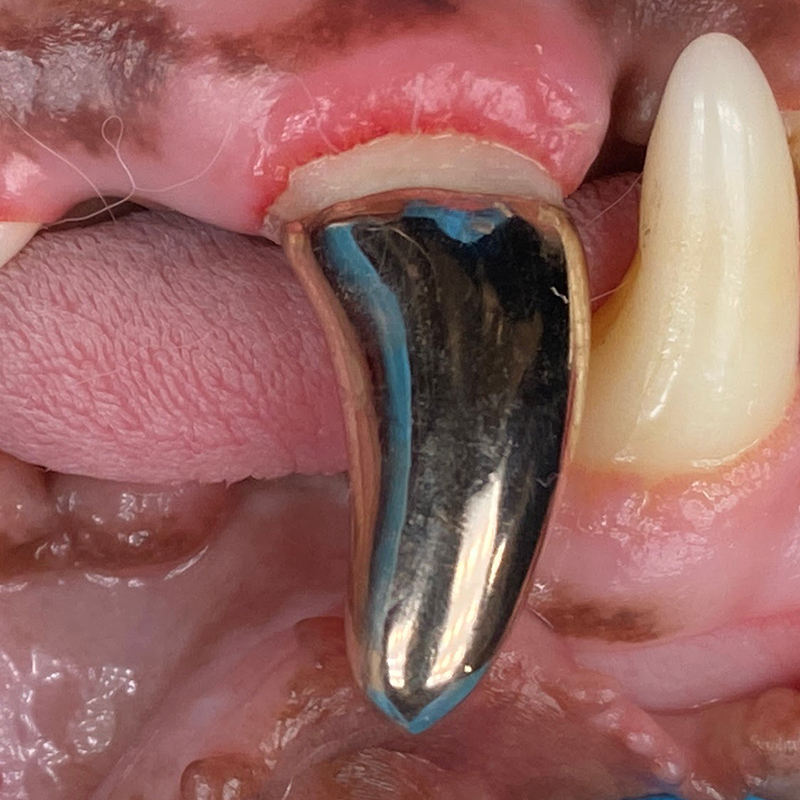Pet Root Canal Treatment
Root canal treatment is designed to address fractured teeth and prevent inflammation. Pets, especially dogs, can fracture their teeth while chewing on hard objects like bones or toys. Cats can also experience fractures from trauma, such as accidental impacts or landing poorly after a jump. These injuries often expose the tooth’s pulp, leading to severe pain and potential infection if left untreated. Root canal treatment provides a reliable alternative to extraction, preserving the tooth and preventing abscess formation in over 90% of cases.
What Is Pet Root Canal Treatment?
Root canal treatment involves removing the damaged or infected pulp and nerve from inside the tooth. The pulp cavity is meticulously cleaned to eliminate bacteria and debris. Once cleaned, the canal is filled with a biocompatible material to prevent further bacterial growth. This process not only resolves existing pain and infection but also safeguards the structural integrity of the tooth.
Unlike human dentistry, pets who undergo root canal treatment rarely require crowns to protect the treated tooth. However, for working dogs or pets with specific needs, prosthodontic crowns made of durable materials like gold or titanium alloy can provide additional protection against future damage. At Aggie Animal Dental Center, we assess each case to determine whether a crown is necessary.
For more information and photos, see our root canal therapy handout.

Considering Root Canal Treatment for Your Pet? Here’s What You Need to Know
The Good:
- If the tooth has not yet formed an abscess, and the fracture doesn’t go below the gumline, RCT enables your pet to keep a structurally or functionally important tooth.
The Bad:
- RCT generally takes longer under anesthesia and costs more than an extraction. On average, RCT for a fractured tooth in a dog costs $4000-4500, and for a cat, $3000-3500.
- With extraction, there is almost no chance of ongoing infection or inflammation. Root canal treatment can fail (and does so about 6% of the time in dogs and 10-20% of the time in cats), meaning the infection and inflammation continue. The only way we know whether the inflammation is resolving is to recheck with x-rays or cone-beam CT. This requires sedation (cone-beam CT) or general anesthesia (x-rays). Recheck imaging is performed 6 months after the RCT and ideally once annually thereafter. The cost of a recheck with sedation is approximately $1500-2000. If the teeth need to be cleaned at the same time, general anesthesia is required (sedation is unsafe for a cleaning because the airway is unprotected) and the cost ranges from $2000-2500.
- If a tooth already has an abscess (facial swelling and/or pus draining), RCT has a much higher failure rate.
- If there is persistent inflammation (i.e., the RCT fails), it could cost an additional $2500-3000 to extract the tooth or $3500-4000 to perform surgical root canal treatment, which then also requires follow-up imaging (see #2 above).
- RCT is not a good option for fractures that extend below the gumline; extraction is recommended for these teeth.
The Ugly:
- A tooth that is brown or grey before RCT will not look considerably whiter after RCT.
- Teeth treated with RCT are more brittle than live teeth, and catastrophic fractures can occur if your pet is still allowed access to hard-chewing objects or if your pet has an accident in the future. It could cost an additional $2500-3500 to extract a fractured tooth after root canal treatment.
- Placement of a prosthodontic crown can reduce, but not eliminate, the chance of refracture. We have seen teeth break off at the gumline, underneath a gold crown.
Benefits of Root Canal Treatment for Pets
Root canal treatment offers several advantages for pets and their owners. It spares the tooth, allowing your pet to maintain normal chewing habits and oral functionality. This is particularly important for pets who rely on their teeth for specific tasks, such as working dogs. Additionally, preserving the tooth helps maintain the overall alignment and health of your pet’s jaw, reducing the risk of future dental complications.
From a recovery standpoint, root canal treatment is less invasive than extraction, leading to quicker healing times and less discomfort for your pet. By addressing the issue promptly, you can ensure your pet’s long-term oral health and comfort.
Expert Care at Aggie Animal Dental Center
At Aggie Animal Dental Center, we combine advanced techniques with compassionate care to provide exceptional dental services for your pet. Our veterinary team is highly experienced in performing root canal treatments and is committed to ensuring your pet’s comfort and well-being throughout the process. We also offer prosthodontic crowns for working dogs to provide added protection against further damage.
If your pet is experiencing dental issues, trust Aggie Animal Dental Center for expert root canal treatment. Contact us today to schedule an appointment or learn more about our specialized dental care services.
